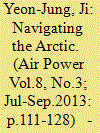| Srl | Item |
| 1 |
ID:
126103


|
|
|
|
|
| Publication |
2013.
|
| Summary/Abstract |
While oil and gas industries are already well established in Siberia and Alaska, the melting of the Arctic ice cap is opening up new areas of the High North to hydrocarbon exploration. According to the US Geological Survey (USGS), the Arctic is expected to hold about 22 per cent of the world's undiscovered, technically recoverable conventional oil and natural gas resources (about 13 per cent of undiscovered oil reserves, 30 per cent of natural gas, and 20 per cent of natural gas liquids). 1 Greenland waters are believed to be particularly rich in oil, and may contain reserves of up to 50 billion barrels, equivalent of Libyan oil reserves. 2 Of the Arctic Council's five member states bordering the Arctic Ocean, Russia and Norway have already submitted continental shelf claims to the Commission on the Limits of the Continental Shelf. Another two member states, Canada and Denmark (on behalf of Greenland) are in the process of submitting their claims. Sovereign rights to offshore hydrocarbon reserves are key issues at stake in these claims. While some analysts see the scenario as a 'scramble' for Arctic hydrocarbons, others highlight the huge technological difficulties of oil and gas extraction in the Arctic, and suggest that territorial disputes are relatively insignificant. 3 Nevertheless, the Arctic region's substantial mineral and hydrocarbon wealth makes issues of sovereignty and governance all the more important to stakeholders, including indigenous peoples as well as states.
|
|
|
|
|
|
|
|
|
|
|
|
|
|
|
|
| 2 |
ID:
128322


|
|
|
|
|
| Publication |
2013.
|
| Summary/Abstract |
For the next few decades, the Arctic will provide problems and prospects which may induce inevitable competition for the lion`s share among the stakeholders. While the arctic was perceived as an undiscovered area and a non-navigable ice cap in the past, recent environmental and scientific changes have brought to the fore the assets of the region. The current size of the ice cape has shrunk by more than 40 percent compared to its size in the late 1970s, which has disclosed an area of open water. The enlarged open water provides the opportunity to explore more economic benefits, and for larger marine and other military activities. The major stakeholders sharing the coastal line of the Arctic are eight states member of the Arctic Council: Canada, Denmark, Finland, Iceland, Norway, Russia, Sweden and the United States. Presently, these states are putting in their utmost efforts in to investigating and participating in exploring the Arctic, which will be the foundation of the legal claim for sovereignty.
|
|
|
|
|
|
|
|
|
|
|
|
|
|
|
|
| 3 |
ID:
118251


|
|
|